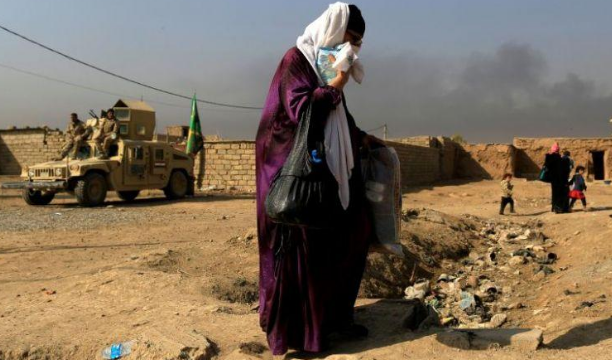
A woman fleeing the fighting between Islamic State and the Iraqi army in the Intisar district of eastern Mosul.Reuters
An Iraqi Christian leader and a senior academic have warned that Christians may not return to Mosul for years to come, if at all, as some residents of the war-torn city celebrate their new freedom from Islamic State.
Father Emanuel Youkhana, a priest of the Assyrian Church of the East, spoke out after visiting Mosul in a military convoy on January 27, the day Iraqi officials raised the national flag over the eastern part of the city. "I don't see a future for Christians in Mosul," he was reported as saying by Catholicphilly.com.
Fr Youkhana talked to residents and soldiers and visited two heavily damaged churches inside the city which was seized by ISIS in 2014, causing Christians and other minorities to flee.
"The churches were used as warehouses by Daesh," he said. "They used the churches to store what they looted from Christian and Yezidi villages, but as the end neared they sold the buildings to local contractors, who started tearing down the walls to reuse the steel inside. If the army hadn't entered for another couple of weeks, the buildings might have been completely destroyed."

Father Emanuel Youkhana visited Mosul with a World Council of Churches delegation.Paul Jeffrey/WCC
He added: "Christians aren't going to come back to stay. The churches I saw were not destroyed with bombs, but by the everyday business operations of the community. How can Christians return to that environment? It's unfortunate, because Mosul needs their skills. Most Christians were part of the intellectual and professional class here, they were doctors and lawyers and engineers and university professors. But I don't see how they can return."
Separately, World Watch Monitor reported similarly pessimistic comments by Charlie Winter, a senior research fellow at the International Centre for Radicalisation Studies at King's College, London.
Winter said "there is no such thing as a post-IS world" and added that ISIS had used propaganda "audaciously" to liken Mosul to the Saudi city of Medina in the days of Mohammed who, in 622 AD left Mecca for Medina after hearing of a plot to kill him.
Winter said that ideological measures will be needed after military victory is achieved. He warned that it is the Iraqi Government's responsibility to provide for all its citizens and that unless this can be achieved stability will be "many, many years" away.
Winter was sharply critical of the pledge by the new US President Donald Trump to "bomb the hell out of ISIS", suggesting that a mere focus on a military response is "damaging" and displays a "foolish and naive and superficial" understanding of the problems in the region.
The Middle East Advocacy Coordinator for global charity Open Doors said: "Open Doors believes that equal citizenship, dignity in different aspects of life and enhanced and inclusive peace and reconciliation efforts – which give faith-based organisations a leading role – are the key three elements for achieving sustainable peace in Mosul and Nineveh."
Open Doors has produced a detailed report on the vital contribution that Christians make in Iraq (and Syria). The report's coordinator, who declined to be named, said: "We need recognition for the vital role of the Church in rebuilding and reconciliation... Maintaining the presence of Christians is not only about them; it is for the good of society as a whole. In the reports and research we've conducted, we have mapped, in a way, all the contributions Christians have given to Iraq."
The report states: "When Christianity spread across what we now call the Middle East and we see that since then until now Christians have contributed to societies in literacy, in health, in translating and contributing to the Arabic language. Some of the best early centres of learning in the world were founded by Christians. Christians were among the first to introduce charitable works and NGOs. We see them involved in politics, and in the development of the Iraqi state. Christians are among the most well-known business people. And in the future Christians, alongside other numerical minorities, are vitally important for the stability of [Iraq]. Policy-makers and researchers agree that we need to maintain diversity in order to counter extremism and radicalisation. We need diversity to ensure sustainable peace and lasting stability in the Middle East."
______________________________________________________________________________________________________________________________________________
(c) 2017 Christian Today
